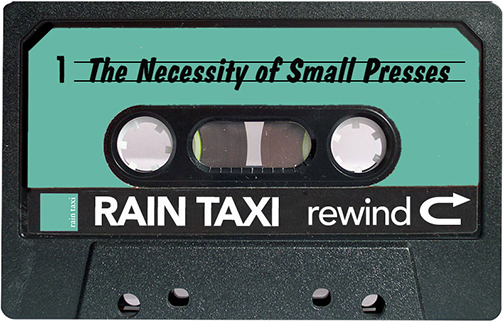 Many literary writers share a similar dream: to have their work considered by the “Big 5” publishing houses, incur a bidding war, and receive a contract with sizeable advance to go with it. This is a perfectly reasonable dream, but for the most part it doesn’t reflect the true landscape of literary publishing. The largest publishing houses can’t usually afford to take risks on writing that doesn’t fit what they see as a profitable and proven sales track, whether that’s a brand-name author or a category of book they know has wide appeal. This does not make them Bad Guys—these houses are large businesses, and they’re perfectly justified in making decisions like large businesses. This, of course, is the crucial spot where small presses come in and play an important role.
Many literary writers share a similar dream: to have their work considered by the “Big 5” publishing houses, incur a bidding war, and receive a contract with sizeable advance to go with it. This is a perfectly reasonable dream, but for the most part it doesn’t reflect the true landscape of literary publishing. The largest publishing houses can’t usually afford to take risks on writing that doesn’t fit what they see as a profitable and proven sales track, whether that’s a brand-name author or a category of book they know has wide appeal. This does not make them Bad Guys—these houses are large businesses, and they’re perfectly justified in making decisions like large businesses. This, of course, is the crucial spot where small presses come in and play an important role.
Before I go on, there are some truths worth stating about the small presses of this country. A small press fights for its meals. It puts together lists each season that must not only pay the bills with little margin for error, but also hold true to the specific mission that the house has remained small in order to accomplish. Most importantly, it’s filled with the exact sort of idealistic, innovative people that the same author dreaming of the large advance is hoping will work on her book. While I was an editor at The Overlook Press, its legendary publisher Peter Mayer said something that stuck with me: “commerce creates culture.” So if all the types of books and writing we love are going to survive as more than just academic or artistic exercise, be it experimental fiction, the literary essay, the classic reissue, or anything else, we’ll owe it to the small presses. They’re the ones figuring out how to forge ahead with the amazing writing a larger house can’t afford to touch.
Some of Rain Taxi’s best profiles of small presses:
“Coach House Books at the Turn of the Century” (Winter 2000/2001, Online) by Tom Orange.
“The Post-Apollo Press” (Spring 2000, Print) by John Olson.
“Logging Laughlin” (Fall 2000, Print), a profile of New Directions by Doug Nufer.
